-
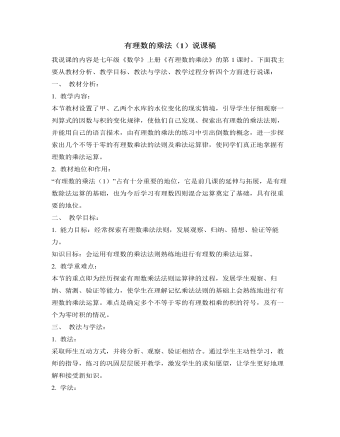
北师大初中数学七年级上册有理数的乘法(1)说课稿
5. 作业: 作业我同样选取不同题型的五个计算题,目的是想查看学生学的效果如何,是否对哪类题型还留有疑问。 6. 自我评价: 这堂课我觉得满意的,是能够利用短暂的45分钟把要学的知识穿插在学与练当中,充分地利用了课堂有限的时间,并且能让学生边学边练,及时巩固。 当然这堂课也有很多不足之处,我觉得自己对于课堂上学生做练习时出现的一些小问题处理还没有能够处理得很好,我应该吸取经验教训,再以后的教学中加以改进。 另外对于多个有理数相乘时的符号问题,我觉得自己归纳得还不是很到位,我想解决的办法是在以后的练习中再做些补充,让学生加深理解。从中我也得到一个教训,再以后的教学工作中,我还应该多学习教学方法,多思考如何归纳知识点,才能更好地帮学生形成一个系统的知识系统!
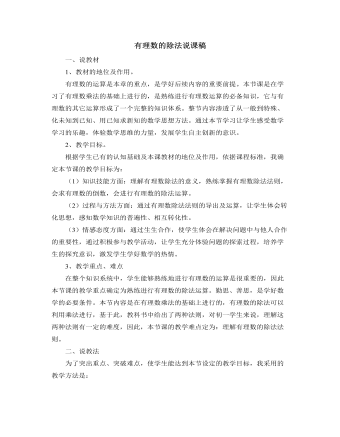
北师大初中数学七年级上册有理数的除法说课稿
五、两点说明。(一)、板书设计这节课的板书我是这样设计的,在黑板的正上方中间处写明课题,然后把板书分为左右两部分,左边是有理数除法的法则,为了培养学生把文字语言转化成符号语言的能力,板书中只出现两种法则的符号表示,从而加深他们对法则的理解,板书右边是学生的板演,以便于比较他们做题中出现的问题。板书下方是课堂小结,重点写出:有理数的除法可以转化成有理数的乘法,以体现本节课中的重要的数学思想方法。有理数的除法板演练习:有理数除法的法则:a÷b=a×1/b(b≠0) 1a>0,b>0,a/b>0;a0; 2a>0,b0,a/b<0. 3课堂小结:有理数的除法 有理数的乘法转化(二)、时间分配:教学过程中的八个环节所需的时间分别为:1分钟、2分钟、5分钟、8分钟、8分钟、16分钟、2分钟、1分钟。
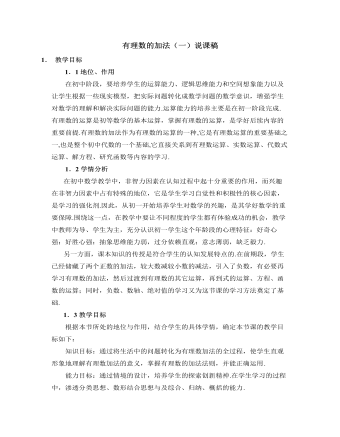
北师大初中数学七年级上册有理数的加法(一)说课稿
在答案的汇总过程中,要肯定学生的探索,爱护学生的学习兴趣和探索欲.让学生作课堂的主人,陈述自己的结果.对学生的不完整或不准确回答,教师适当延迟评价;要鼓励学生创造性思维,教师要及时抓住学生智慧的火花的闪现,这一瞬间的心理激励,是培养学生创造力、充分挖掘潜能的有效途径.预先设想学生思路,可能从以下方面分类归纳,探索规律:① 从加数的不同符号情况(可遇见情况:正数+正数;负数+负数;正数+负数;数+0)② 从加数的不同数值情况(加数为整数;加数为小数)③ 从有理数加法法则的分类(同号两数相加;异号两数相加;同0相加)④ 从向量的迭加性方面(加数的绝对值相加;加数的绝对值相减)⑤ 从和的符号确定方面(同号两数相加符号的确定;异号两数相加符号的确定)教学中要避免课堂热热闹闹,却陷入数学教学的浅薄与贫乏.
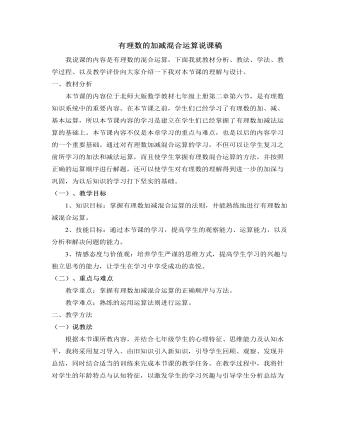
北师大初中数学七年级上册有理数的加减混合运算说课稿
5、总结学生解题过程中存在的问题,并指导并纠正、分析根本原因。6、通过演示法给学生演示完整、详细和规范的解题过程。7、总结有理数的运算顺序和方法。先让学生自己总结运算顺序,培养学生自己思考的能力,然后教师进行纠正。等这个过程结束之后,再给出完整的运算顺序和方法。8、出示练习题,巩固所学知识,教师及时指正。9、最后布置课后作业题。四、教学评价本节课我注重体现“以教师为主导、学生为主体、以学生发展为本的教学思想”。1、通过具体的题目引入,让学生先以自己的知识体系解决问题,在这过程中发现问题、归纳总结原因,并予以解决。一方面复习前面所学的基本运算,另一方面完善学生的知识体系。2、培养学生自主学习与探究的能力、分析与解决问题的能力。
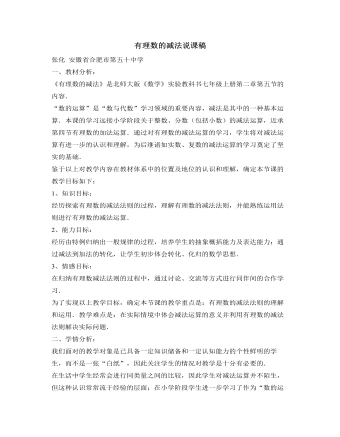
北师大初中数学七年级上册有理数的减法说课稿
“数的运算”是“数与代数”学习领域的重要内容,减法是其中的一种基本运算.本课的学习远接小学阶段关于整数、分数(包括小数)的减法运算,近承第四节有理数的加法运算.通过对有理数的减法运算的学习,学生将对减法运算有进一步的认识和理解,为后继诸如实数、复数的减法运算的学习奠定了坚实的基础.鉴于以上对教学内容在教材体系中的位置及地位的认识和理解,确定本节课的教学目标如下:1、知识目标:经历探索有理数的减法法则的过程,理解有理数的减法法则,并能熟练运用法则进行有理数的减法运算.2、能力目标:经历由特例归纳出一般规律的过程,培养学生的抽象概括能力及表达能力;通过减法到加法的转化,让学生初步体会转化、化归的数学思想.3、情感目标:
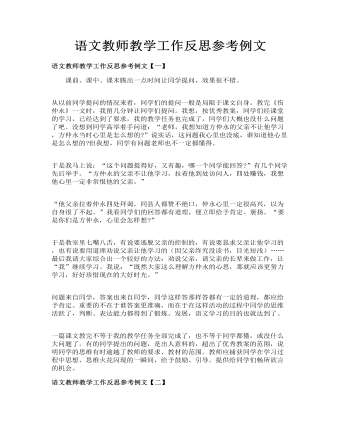
语文教师教学工作反思参考例文
于是我马上说:“这个问题提得好,又有趣,哪一个同学能回答?”有几个同学先后举手。“方仲永的父亲不让他学习,拉着他到处访问人,四处赚钱,我想他心里一定非常恨他的父亲。” “他父亲拉着仲永四处拜谒,同县人都赞不绝口,仲永心里一定很高兴,以为自身很了不起。”我看同学们的回答都有道理,便立即给予肯定、褒扬。“要是你们是方仲永,心里会怎样想?”
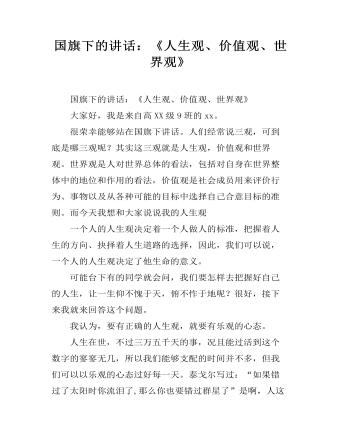
国旗下的讲话:《人生观、价值观、世界观》
国旗下的讲话:《人生观、价值观、世界观》大家好,我是来自高XX级9班的xx。很荣幸能够站在国旗下讲话。人们经常说三观,可到底是哪三观呢?其实这三观就是人生观,价值观和世界观。世界观是人对世界总体的看法,包括对自身在世界整体中的地位和作用的看法,价值观是社会成员用来评价行为、事物以及从各种可能的目标中选择自己合意目标的准则。而今天我想和大家说说我的人生观一个人的人生观决定着一个人做人的标准,把握着人生的方向、抉择着人生道路的选择,因此,我们可以说,一个人的人生观决定了他生命的意义。可能台下有的同学就会问,我们要怎样去把握好自己的人生,让一生仰不愧于天,俯不怍于地呢?很好,接下来我就来回答这个问题。我认为,要有正确的人生观,就要有乐观的心态。人生在世,不过三万五千天的事,况且能过活到这个数字的寥寥无几,所以我们能够支配的时间并不多,但我们可以以乐观的心态过好每一天。泰戈尔写过:“如果错过了太阳时你流泪了,那么你也要错过群星了”是啊,人这一生说长不长,说短也不短,难免会碰到不如意的事,使你寸步难行,举步维艰,但这仅仅是暂时的阴影,我们大可以在这阴影中沉论,但如果这样,你就忘了:当你面前满是阴影是,你却忽略了背后的整片阳光。所以,为什么不以乐观的心态笑对生命中的不如意呢?
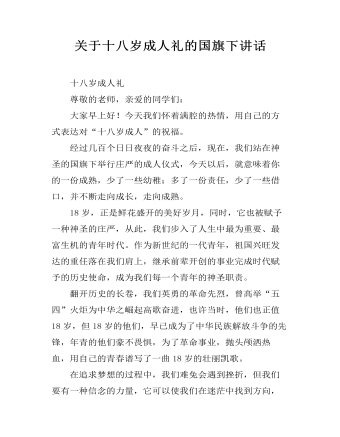
关于十八岁成人礼的国旗下讲话
十八岁成人礼尊敬的老师,亲爱的同学们:大家早上好!今天我们怀着满腔的热情,用自己的方式表达对“十八岁成人”的祝福。经过几百个日日夜夜的奋斗之后,现在,我们站在神圣的国旗下举行庄严的成人仪式,今天以后,就意味着你的一份成熟,少了一些幼稚;多了一份责任,少了一些借口,并不断走向成长,走向成熟。18岁,正是鲜花盛开的美好岁月,同时,它也被赋予一种神圣的庄严,从此,我们步入了人生中最为重要、最富生机的青年时代。作为新世纪的一代青年,祖国兴旺发达的重任落在我们肩上,继承前辈开创的事业完成时代赋予的历史使命,成为我们每一个青年的神圣职责。翻开历史的长卷,我们英勇的革命先烈,曾高举“五四”火炬为中华之崛起高歌奋进,也许当时,他们也正值18岁,但18岁的他们,早已成为了中华民族解放斗争的先锋,年青的他们豪不畏惧,为了革命事业,抛头颅洒热血,用自己的青春谱写了一曲18岁的壮丽凯歌。
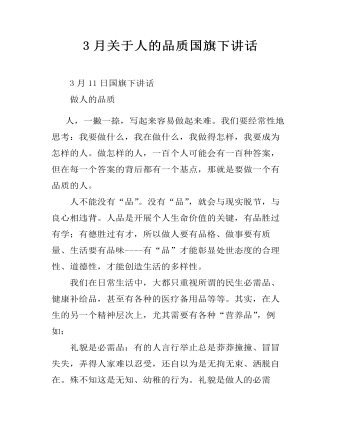
3月关于人的品质国旗下讲话
3月11日国旗下讲话做人的品质 人,一撇一捺,写起来容易做起来难。我们要经常性地思考:我要做什么,我在做什么,我做得怎样,我要成为怎样的人。做怎样的人,一百个人可能会有一百种答案,但在每一个答案的背后都有一个基点,那就是要做一个有品质的人。人不能没有“品”。没有“品”,就会与现实脱节,与良心相违背。人品是开展个人生命价值的关键,有品胜过有学;有德胜过有才,所以做人要有品格、做事要有质量、生活要有品味----有“品”才能彰显处世态度的合理性、道德性,才能创造生活的多样性。我们在日常生活中,大都只重视所谓的民生必需品、健康补给品,甚至有各种的医疗备用品等等。其实,在人生的另一个精神层次上,尤其需要有各种“营养品”,例如:礼貌是必需品:有的人言行举止总是莽莽撞撞、冒冒失失,弄得人家难以忍受,还自以为是无拘无束、洒脱自在。殊不知这是无知、幼稚的行为。礼貌是做人的必需品,有礼才能让人又敬又爱。
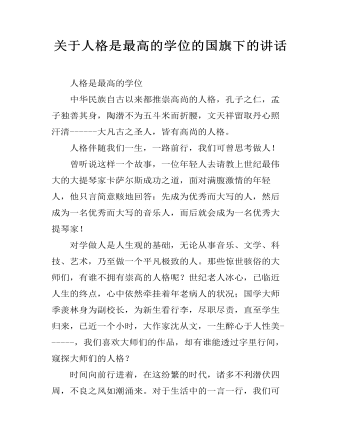
关于人格是最高的学位的国旗下的讲话
人格是最高的学位中华民族自古以来都推崇高尚的人格,孔子之仁,孟子独善其身,陶潜不为五斗米而折腰,文天祥留取丹心照汗清------大凡古之圣人,皆有高尚的人格。人格伴随我们一生,一路前行,我们可曾思考做人!曾听说这样一个故事,一位年轻人去请教上世纪最伟大的大提琴家卡萨尔斯成功之道,面对满腹激情的年轻人,他只言简意赅地回答:先成为优秀而大写的人,然后成为一名优秀而大写的音乐人,而后就会成为一名优秀大提琴家!对学做人是人生观的基础,无论从事音乐、文学、科技、艺术,乃至做一个平凡极致的人。那些惊世骇俗的大师们,有谁不拥有崇高的人格呢?世纪老人冰心,已临近人生的终点,心中依然牵挂着年老病人的状况;国学大师季羡林身为副校长,为新生看行李,尽职尽责,直至学生归来,已近一个小时,大作家沈从文,一生醉心于人性美------,我们喜欢大师们的作品,却有谁能透过字里行间,窥探大师们的人格?

新人教版高中英语必修3Unit 4 Space Exploration-Listening&Speaking&Talking教学设计一
Listening and Speaking introduces the topic of “talking about how to become an astronaut”. This period is aimed to inform students some details about the requirements of being an astronaut. Students can be motivated and inspired by the astronauts. Teachers ought to encourage students to learn from them and let them aim high and dream big.Listening and Talking introduces the theme of "talk about life in space". This part also informs students more details about life in space and can inspire students to be curious about this job. 1. Guide students to listen for numbers concerning dates, years and ages etc2. Cultivate students' ability to talk about how to become an astronaut and life in space ; 3. Instruct students to use functional sentences of the dialogue such as “ first of all, I am not sure, so what might be .. I guess.. I wonder…I am curious…)appropriately.1. Guide students to understand the content of listening texts in terms of the whole and key details; 2. Cultivate students' ability to guess the meaning of words in listening; discuss with their peers how to become a qualified astronaut and describe the life in space.Part 1: Listening and SpeakingStep 1: Lead inPredictionThe teacher can ask students to predict what the listening text is about by looking at the pictures.About how to become an astronaut./the requirements of an astronautStep 2: Then, play the radio which is about an interview a. And after finishing listening for the first time, the students need to solve the following tasks.

新人教版高中英语必修3Unit 1 Festivals and Celebrations-Listening &Speaking&Talking教学设计
The theme of this section is “Talk about festival activities and festival experiences”.Festival and holiday is a relaxing and interesting topic for students. This part talks about the topic from the daily life of students’. In the part A ---Listening and Speaking, there are three conversations among different speakers from three countries(Japan, Rio and China), where the speakers are participating in or going to participate in the festivals and celebrations. So listening for the relationship among them is a fundamental task. Actually, with the globalization and more international communication, it is normal for Chinese or foreigners to witness different festivals and celebrations in or out of China. In the Conversation 1, a foreign reporter is interviewing a Japanese young girl who just had participated in the ceremony of the Coming-of-Age Day on the street and asking her feeling about the ceremony and the afterwards activities. Conversation 2, Chinese girl Li Mei is witnessing the Rio Carnival for the first time, and her friend Carla gives her some advice on the costumes which enables her to match with the carnival to have a good time. Conversation 3, a Chinese guide is showing a group of foreign visitors around the Lantern Festival and introducing the customs of the festival to them. The three conversations have a strong vitality and insert the festival and cultural elements from different countries. So perceiving the festivals and cultures from different countries is the second task. At the same time, the scripts also insert the targeted grammar --- v-ing as attributive and predicative, which students can perceive and experience in a real context and make a road for the further study. That is the third task. In the Part B--- Listening and Talking, the theme is “Talk about festival experience”, which is the common topic in our daily conversations. During the conversation, Song Lin, a Chinese student, asked Canadian friend Max about how to spend Christmas. In the conversation, Song Lin talked about experience and the feelings during the Chinese Spring Festival, during which there are not only some enjoyable things but some unpleasant things. After the listening, perhaps students find there are some similarities between Christmas and the Chinese Spring Festival as there are some differences in the origins and celebrations. For example, people always visit friends and relatives, decorate their houses, have a big dinner together, chat and give presents to each other.

新人教版高中英语必修3Unit 2 Morals and Virtues-Listening &Speaking&Talking教学设计
Example:One day, a poor boy who was trying to pay his way through school by sending newspapers door to door found that he only had one dime(一角)left. He was so hungry that he decided to beg for a meal at the next house.However, he lost his nerve when a lovely young woman opened the door. Instead of a meal he asked for a drink of water. She thought he looked hungry so she brought him a large glass of milk. He drank it slowly, and then asked, “How much do I owe you?” “You don’t owe me anything,” she replied, “Mother has taught me never to accept pay for a kindness.” “Then I thank you from the bottom of my heart.” With these words, Howard Kelly left that house.Years later the woman became badly ill and was finally sent to the hospital in a big city. Dr. Howard Kelly, now famous, was called in. When he heard the name of the town she came from, a strange light filled his eyes. Dressed in his doctor’s clothes, Dr. Kelly went into her room and recognized her at once. From that day on, he gave special attention to her, and decided to do his best to save her life.At last the woman was saved. Dr. Kelly asked the business office to pass the final bill to him. He looked at it and then wrote something on the side. The bill was sent to the woman’s room. She was afraid to open it because she was sure that it would take the rest of her life to pay for it off. Finally she looked, and the note on the side of the bill caught her attention. She read these words: “Paid in full with a glass of milk, Dr. Howard Kelly.” Tear of joy flooded her eyes.

新人教版高中英语必修3Unit 3 Diverse Cultures-Reading for Writing教学设计
The topic of this part is “Describe a place with distinctive cultural identity”.This section focuses on Chinese culture by introducing Chinatown, whose purpose is to show the relationship between the Chinese culture and American culture. The Chinese culture in Chinatown is an important part of American culture. Chinatown is an important window of spreading Chinese culture and the spirit homeland of oversea Chinese, where foreigners can experience Chinese culture by themselves.Concretely, the title is “Welcome to Chinatown!”, from which we can know that the article aims at introducing Chinatown. The author used the “Introduction--Body Paragraph--Conclusion” to describe the people, language, architecture, business, famous food and drinks and people’s activities, which can be a centre for Chinese culture and shows its unique charm.1. Read quickly to get main idea; read carefully to get the detailed information.2. Learn the characteristics of writing and language.3. Learn to introduce your own town according to the text.4. Learn to correct others’ writing.1. Learn the characteristics of writing and language.2. Learn to introduce your own town according to the text.Step 1 Lead in ---Small talkIn the reading part, we mentioned the Chinatown of San Francisco. How much do you know about Chinatown of San Francisco ?Chinatown is a main living place for Chinese immigrants, where you can see many Chinese-style buildings, costumes, operas, restaurants, music and even hear Chinese.Step 2 Before reading ---Predict the contentWhat is the writer’s purpose of writing this text ? How do you know ?From the title(Welcome to Chinatown) and some key words from the text(tourist, visit, visitors, experience), we can know the purpose of the text is to introduce Chinatown and show the relationship between Chinese culture and American culture.

新人教版高中英语必修3Unit 3 Diverse Cultures-Reading and Thinking教学设计
Discuss these questions in groups.Q1: Have you ever been to a place that has a diverse culture ? What do you think about the culture diversity ?One culturally diverse place that I have been to is Harbin, the capital city of Heilongjiang Province. I went there last year with my family to see the Ice and Snow Festival, and I was amazed at how the culture as different to most other Chinese cities. There is a big Russian influence there, with beautiful Russian architecture and lots of interesting restaurants. I learnt that Harbin is called “the Oriental Moscow” and that many Russians settled there to help build the railway over 100 years ago.Q2: What are the benefits and challenges of cultural diversity ?The benefits: People are able to experience a wide variety of cultures, making their lives more interesting, and it can deepen the feelings for our national culture, it is also helpful for us to learn about other outstanding culture, which helps improve the ability to respect others. The challenges: People may have trouble communicating or understanding each other, and it may lead to disappearance of some civilizations and even make some people think “The western moon is rounder than his own.”Step 7 Post reading---RetellComplete the passage according to the text.Today, I arrived back in San Francisco, and it feels good (1) _____(be) back in the city again. The city succeeded in (2)_________ (rebuild) itself after the earthquake that (3)________ (occur) in 1906, and I stayed in the Mission District, enjoying some delicious noodles mixed with cultures. In the afternoon, I headed to a local museum (4)____ showed the historical changes in California. During the gold rush, many Chinese arrived, and some opened up shops and restaurants in Chinatown to earn a (5)_____ (live). Many others worked on (6)______ (farm), joined the gold rush, or went to build the railway that connected California to the east. The museum showed us (7)____ America was built by immigrants from (8)________ (difference) countries and cultures. In the evening, I went to Chinatown, and ate in a Cantonese restaurant that served food on (9)________(beauty) china plates. Tomorrow evening, I’m going to (10)__ jazz bar in the Richmond District. 答案:1. to be 2. rebuilding 3. occurred 4. that 5.living6. farms 7.how 8. different 9. beautiful 10. a

新人教版高中英语必修3Unit 4 Space Exploration-Discovering Useful Structure教学设计
The theme of the section is “Describe space facts and efforts to explore space”. Infinitives are one of non-finite verbs, as the subjects, objects, predicative, attributes and adverbials. This unit is about space exploration, which is a significant scientific activity, so every scientific activity has strong planning. Therefore, using the infinitives to show its purpose, explanations or restrictions is the best choice.1. Learn the structure, functions and features of infinitives.2. Learn to summarize some rules about infinitives to show purpose and modify.3. Learn to use infinitives in oral and writing English. 1. Learn the structure, functions and features of infinitives.2. Learn to summarize some rules about infinitives to show purpose and modify.3. Learn to use use infinitives in oral and writing English.Step 1 Lead in---Pair workLook at the following sentences and focus on the italicized infinitives. In pairs, discuss their functions. 1. I trained for a long time to fly airplanes as a fighter pilot..(作目的状语)2. As we all know, an astronaut needs to be healthy and calm in order to work in space..(作目的状语)3. First of all, you must be intelligent enough to get a related college degree..(作目的状语)4. Some scientist were determined to help humans realise their dream to explore space..(作定语)5. On 12 April 1961, Yuri Gagarin became the first person in the world to go into space..(作定语)Summary:1. 不定式的结构:to+do原形。2. 分析上面的句子,我们知道在描述太空探索时,动词不定式不仅可以用来表目的,还可以用来作定语,表修饰。

新人教版高中英语必修3Unit 4 Space Exploration-Reading and Thinking教学设计一
Q4: What is the function of the International exploration ?Having astronauts from different countries on boardQ5: What can you learn from Para 4 ?China has made great achievements in exploring spaceQ6: What is the attitude to the space exploration ?SupportiveStep 6 Post reading---RetellPeople have always wanted to learn more about space. Before the mid-20th century, most people felt (1)_________ (travel) into space was an impossible dream. However, (2)____ the help of scientists, peoplesucceeded in realizing their dream (3) _________ (explore) space. On 4 October 1957, the Sputnik 1 satellite (4) ____________(launch) by the USSR. (5) ________________ scientists try to make sure nothing goes wrong, accidents can still happen. These disasters made everyone(6)___________(disappoint), but people still believe in the importance of (7) ________(carry) on space exploration. In 2003, China became the third country to (8)_____________ (independent) send humans into space. Then Shenzhou 6 and 7 completed (9)____ second manned orbit and the first Chinese spacewalk. In spite of the difficulties, scientists hope future (10)__________ (discovery) will not only enable us to understand the universe but also help us survive well into the future.Answers: 1. travelling 2. with 3. to explore 4. was launched 5. Although6. disappointed 7. carrying 8. independently 9. a 10. discoveriesStep 6 Post reading---Critical thinkingQ1: What do you think of the space exploration ? I think it is beneficial to us. Through further study of space, people will make full use of it in the future, such as the space experiments by Wang Yaping in Tian Gong 1.Q2: If you are determined to be an astronaut, what should you prepare at present ?First of all, I should study hard to get a related college degree. Besides, I must keep mental and physical healthy.Step 7. HomeworkTry to summarize the structure of the article by a mind map.

新人教版高中英语必修3Unit 4 Space Exploration-Reading For Writing教学设计一
另一方面,其余的人反对这个计划,因为它可能会导致一些不好的影响。7.I hold the belief that space exploration not only enable us to understand how the universe began but also help us survived well into the future.我坚信探索太空不仅能够使我们了解宇宙的起源而且能够帮助我们更好地走进未来。8.I think we should spend more time and money exploring space so as to provide new and better solutions to people's shortterm and longterm problems.为了给人类的短期和长期问题提供更新和更好的解决方法,我认为我们应该花更多的时间和金钱来探索太空。9.From my point of view,it is wrong of young people to depend on their telephones too much,which may do harm to both their physical and mental health.在我看来,年轻人过度依赖手机是不对的,因为它们可能会对他们的身心健康都有害。最近你班同学就“人类是否应该进行宇宙探索”这个问题进行了激烈的讨论。有人认为,探索宇宙不仅让人类更好地了解宇宙的发展,还可以用来指导农业生产,以及把一些探索太空的高新技术用于现实生活;也有一些人认为探索太空花掉了大量的人力物力;影响了人们的生活水平。请你根据以下情况写一篇报告并发表自己的观点。注意:1.写作内容应包括以上全部要点,可适当发挥,使上下文连贯;

新人教版高中英语必修3Unit 5 The Value of Money- Discovering Useful Structure教学设计
Step 3 Meaning1. 过去将来时表示从过去某一时间来看将要发生的动作或存在的状态, 常用在宾语从句中。一般由“would/should +动词原形”构成。She hoped that they would meet again someday. 她希望将来有一天他们能再见面。2. was/were going to+动词原形: 表示过去将要发生或很有可能发生的动作, 常用于口语中, 表示预言、意图或者打算等。He was going to start work the following week. 他打算下星期开始工作。3. was/were about to do: 常用来表示即将发生的动作, “刚要/正要做……”。注意该结构不与任何时间状语连用。I felt that something terrible was about to happen. 我感到某种可怕的事情即将发生。4.was/were to do: 表示“曾计划做某事”, 如果表示“本来计划做某事, 动作没实现”, 则需用 “was/were to have done”。She said she was to have told me about the accident. 她说她本来想告诉我关于事故的事。5.Start, go, come, leave, see, meet等动词的过去进行时: 表示就过去某一时刻而言即将发生的动作。She was coming later. 她随后就来。I had just put on my overcoat and was leaving to visit a friend of mine. 我刚穿上外套要去看我的一个朋友。

新人教版高中英语必修3Unit 5 The Value of Money-Listening &Speaking教学设计
Step 4: Listen again and decide if the following statements are true (T) or false (F).1 It was the first time Chen Liyan's story was reported. T口 F口2 Chen found 10,000 yuan in a small plastic bag in Taiyuan railway station口 F口3 Wang Zheng apologized to Chen because he couldn't offer her more money. T口 F口4 Chen took out a large loan to cure her daughter, T口 F口5 Wang set up a fundraising website for Chen's daughter after Chen told him about her situation. T口 F口Step 5:After listening, discuss the questions.1 What kind of person do you think Chen Liyan is?Chen Liyan is generous and honest because she returned a large sum of money to the owner.2 Did Chen return the money because she didn't need it?No. She returned the money because it was the right thing to do. Evidence for this is that she refused to accept the reward money because she felt that it had not been earned. 3 Is it common for people to do what Chen did?It depends on the culture. In some countries it is quite common to return money that has been found. In other countries, people believe "Finders are keepers!" 4 How did Wang Zheng feel about the return of his money?He must have been very happy and relieved to have gotten his money back. We know this because he thanked Chen repeatedly and even offered her a reward.5 Why did Ma Dongbao tell Wang about Chen's family?He must have had great sympathy for Chen and her daughter and wanted to help them.'We know this because he arranged help for them. 6 How did the news reporter feel about Chen's actions?The news reporter felt that it showed that money wasn't the most important thing in life. We know this because the reporter told us that this is what Chen believes. and then said, “that's a great attitude to take."

